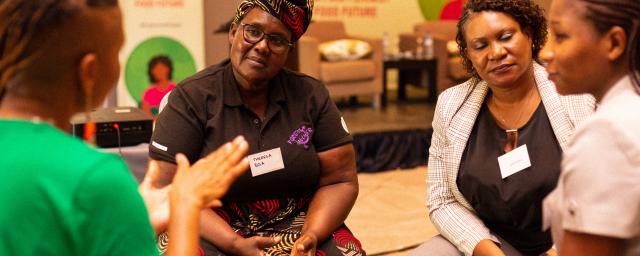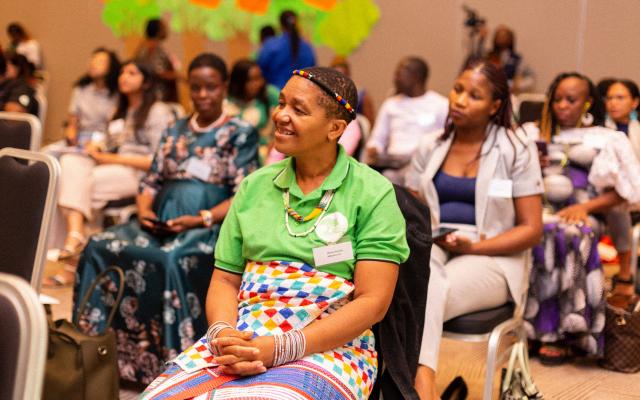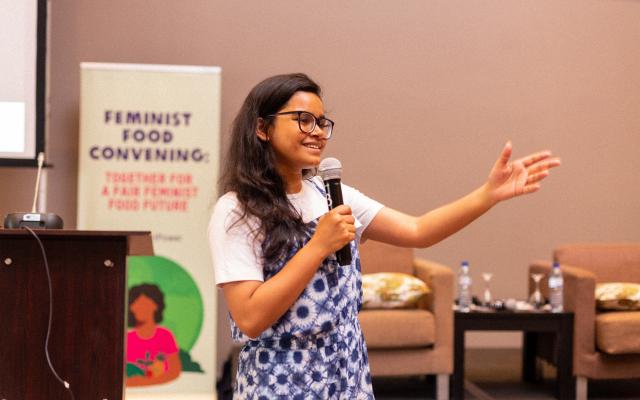
Women, grassroot activists, field facilitators and women farmers at the Feminist Food Convening discussing the issues women, who were sharing their knowledge and to learn from each other.
Photo credit: Alcides Soares
To finally land in Maputo felt surreal. Going to Africa has always been a dream that I thought would never come true. Which made me very grateful to finally be there. As I got out of the plane, the sun was hotter than back in my home country, Indonesia. But I was much too excited for the week ahead. This trip was very special. As a newbie in Oxfam, I was very happy to finally meet the food activists that we have been working with. They are women food producers, small-scale farmers, indigenous women and community leaders from Africa, Asia and South America. They are the ones who are feeding and nourishing the world, while working tirelessly to protect the soil, water and resources we need to produce food. Over 60 activists and women food producers are gathering for this Makhadzi(1) Feminist Food Convening.
About 70%-80% of the world’s food is produced by small-scale farming(2), therefore women are at the heart of the food system. While women globally represent a majority of the agricultural workforce and are custodians of food, the food heritage and culture, and making household decisions on food - the global food system is characterized by corporate capture, political failure, perverse market incentives and destructive industrial agriculture. Studies have shown that women represent upwards of 40% of the agricultural labor force globally and grow much of the food for their families and communities(3). Yet, they produce 20-30% less than men farmers because they face two compounding layers of exclusion - as smallholder farmers and as women(4). Equalizing this gap could boost agricultural output and decrease global hunger by 17%(5).
1 Makhadzi was a term introduced by one of the participants, Mphatheleni Makaulule, an indigenous woman leader from South Africa. It refers to both woman and the moon.
2 Farms, family farms, farmland distribution and farm labour: What do we know today? FAO, 2019
3 Invisible Farmers: Why recognizing and supporting women farmers is key to food and nutrition security (worldbank.org)
4 Empowering women farmers to end hunger and poverty | Oxfam International
5 FAO - News Article: Closing the gender gap in agriculture.
Thousands of women have developed agricultural practices since ancient times. It is clear that women are the ones making food, and they deserve their labour rights being respected.

Photo credit: Alcides Soares
In the Convening, I met indigenous women, grassroot activists, field facilitators and women farmers who were eager to share their knowledge and to learn from each other. I was very humbled to meet these inspiring women who travelled all the way from their hometown in different parts of the world. Some of them had to drive all the way from their villages, then take two or three connecting flights to get to Maputo. Many issues were discussed at the Convening. Not only the problems they are facing on a day- to-day basis, like the harmful nature of pesticide usage, lack of land ownership of women, the need for women to have greater access to markets; but also the solutions to these problems. A feminist agroecological approach was one of solutions that was heavily discussed and ensure women are charting the course for a Just Agricultural Transition to get there.
One of the most inspiring sessions was when we all got to breakdown what would a feminist food system mean for each of us. Even with all the language barriers, as well as different geographical and cultural backgrounds, we were able to find a common understanding. We all agreed that in a feminist food system, all women, including the most marginalized, would have equal access to the tools and resources they need to grow food in an agroecological way.
Whether in wage labour or as farmers, women’s work should be respected, dignified and remunerated with a living wage or income. Through a radical redistribution of care work, women can rest and recover, which gives them time and space to participate in critical decision-making. In a feminist food system, private sector actors, such as large agribusinesses, and governments must adopt policies and practices that are gender-responsive and enable rural communities, small-scale farmers and workers to flourish. As a result, women and marginalized communities are not only food secure; they are food sovereign. They must have access to healthy and safe food that nourishes them, that they can enjoy, share, and that allows them to express their cultures.

Photo credit: Alcides Soares
“Recognizing that the contributions of women rural farmers are from seed to feed. We are not asking, we are claiming a feminist food system.”
We also brainstormed how we can move forward with these ideas. We concluded that to reach this
feminist food system of the future, we need a Just Agricultural Transition. We will harness our collective power to steer this transition in the right direction. As a collective, we decided we need to ensure women’s rights are supported by gender-responsive government policies, not only on paper but also in practice. These policies protect land rights defenders and enable women’s ownership over their lands and seeds. This requires that women farmers are enabled to participate in decision-making through investments in space, resources and capacity. Through our strong alliances and the continuation of this collective we co-created, rural women can then raise awareness, sensitize communities, and make their voices heard by powerholders.
We also recognized that small-scale farmers are weathering a climate crisis while nourishing the world. As citizens, consumers and as members of organizations, governments and companies, we confirmed together that we would harness our influence to mitigate climate change through our regenerative farming practices and build the resilience of frontline communities. All the women also agreed that we need to break the corporate control over the food system. This means both working with the private sector and holding big companies accountable. It requires that we demystify complex food supply chains through power mapping, transparency and traceability. In using tools like human rights and environmental due diligence, corporations are collectively responsible for ensuring that workers and farmers can participate meaningfully.
“To build a feminist food system, we need to challenge and shift power. That is what we are doing, and need to continue going forward.”
The experience of being surrounded by and learning from these women was both humbling and empowering. I will forever be grateful for their wisdom and generosity. I was filled with a kind of energy that I have never experienced before. It was powerful, yet soft and nurturing. Then I realised this is what #FeministPower is about. The fact that the Convening was happening towards the end of March, women’s month, was not lost on any of us. When I looked back at this week, where women from different parts of the world were coming together and sharing the same dreams towards a just and feminist food system, it was just the perfect way to end the International Women's Month. May we celebrate the women who produce our food all months, all year long.